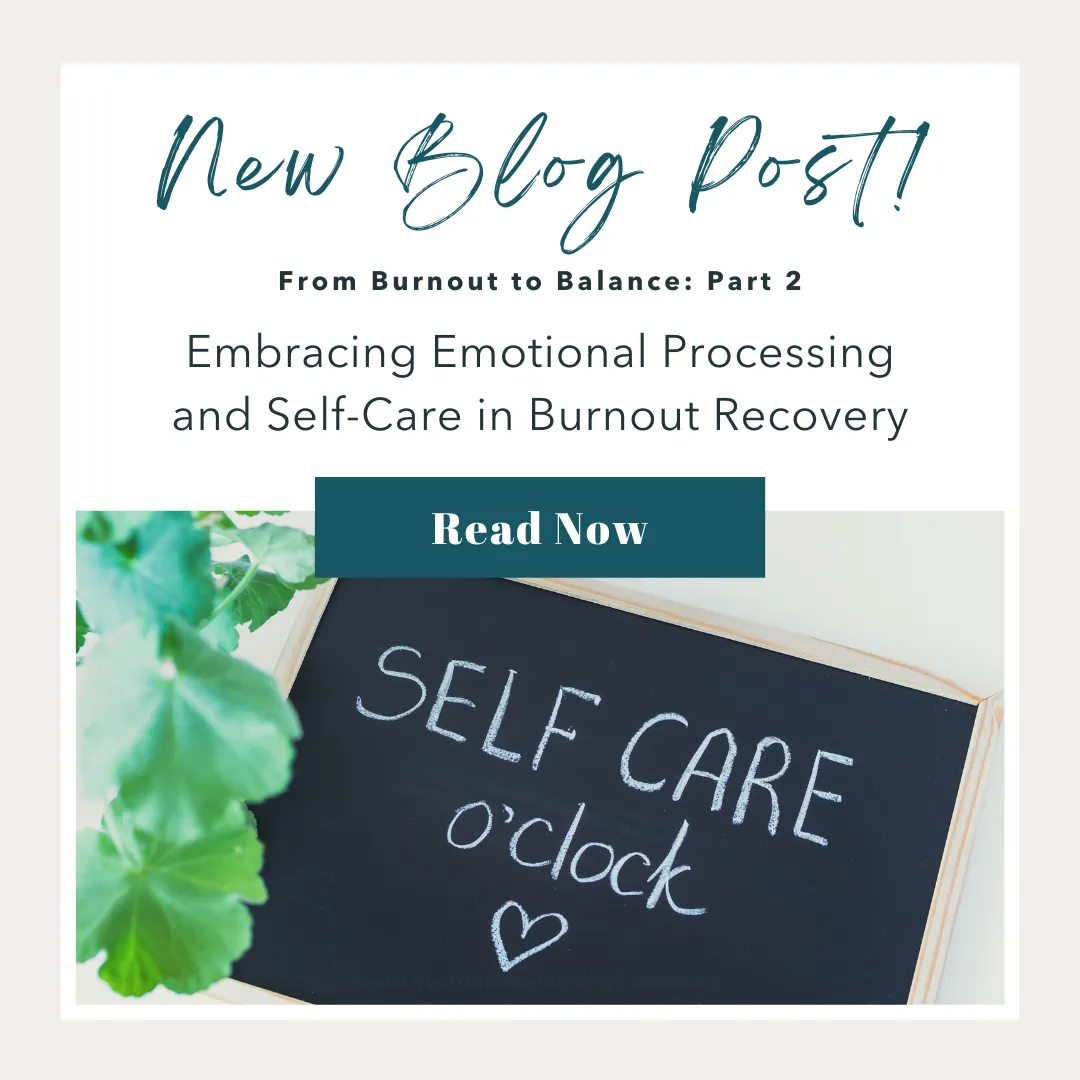Blog

From Burnout to Balance: Part 2 - Embracing Emotional Processing and Self-Care in Burnout Recovery
In our previous article, we discussed the signs and symptoms of burnout, a state of emotional, physical, and mental exhaustion that affects a staggering 77% of professionals. Recognizing these signs is the first step towards recovery. However, understanding how to process these emotions and the role of self-care in recovery is equally important.
Embracing Emotional Processing
Emotional processing is a crucial part of healing from burnout. It involves acknowledging and dealing with your feelings rather than ignoring them or pushing them aside. Studies show that suppressing emotions can lead to increased stress and burnout, while healthy emotional processing can reduce stress and improve overall well-being.
Here are some healthy outlets for emotional processing:
Exercise: Physical activity can help reduce stress and improve mood. Whether it's a brisk walk, a yoga session, or a high-intensity workout, find an activity that you enjoy and make it a part of your routine.
Talking to Trusted Individuals: Sharing your feelings with someone you trust can provide a sense of relief and understanding. This could be a friend, family member, coach, therapist, or hypnotherapist.
Crying: Crying can be a natural response to stress and a healthy way to express and release emotions.
Hugging: Physical touch, like hugging, can release oxytocin, a hormone that reduces stress and promotes feelings of calm and well-being.
Laughter: Laughter can reduce stress, improve mood, and even boost immunity. Find something that makes you laugh, whether it's a funny movie, a joke, or a humorous book.
The Role of Self-Care in Burnout Recovery
Self-care is not just about pampering yourself; it's about taking care of your physical, emotional, and mental health. It's about setting boundaries, taking time for activities you enjoy, and treating yourself with kindness and respect.
Here are some self-care tips that can aid in burnout recovery:
Prioritize Rest: Ensure you're getting enough sleep each night. Establish a regular sleep schedule and create a relaxing bedtime routine.
Eat a Balanced Diet: Nutritious food can boost your energy levels and overall health. Include plenty of fruits, vegetables, lean proteins, and whole grains in your diet.
Practice Mindfulness: Mindfulness can help you stay present and connected with your emotions. Consider practices like meditation, deep breathing, or yoga.
Seek Professional Help: If you're struggling with burnout, don't hesitate to seek help from a professional, such as a coach, hypnotherapist, therapist, or doctor.
Keep in mind, seeking help and dedicating time for self-care are not only acceptable but essential. Recovering from burnout is a journey that unfolds step by step.
If you'd like to learn more about Mindset Coaching or Hypnotherapy and how it can support your journey, book your complimentary 30-min consultation for a personalized recommendation.
In the upcoming Part 3 of this series, titled "Shifting Perspectives for Sustainable Balance," we will explore further strategies to prevent burnout and sustain a balanced lifestyle. Stay tuned!
Blog

From Burnout to Balance: Part 2 - Embracing Emotional Processing and Self-Care in Burnout Recovery
In our previous article, we discussed the signs and symptoms of burnout, a state of emotional, physical, and mental exhaustion that affects a staggering 77% of professionals. Recognizing these signs is the first step towards recovery. However, understanding how to process these emotions and the role of self-care in recovery is equally important.
Embracing Emotional Processing
Emotional processing is a crucial part of healing from burnout. It involves acknowledging and dealing with your feelings rather than ignoring them or pushing them aside. Studies show that suppressing emotions can lead to increased stress and burnout, while healthy emotional processing can reduce stress and improve overall well-being.
Here are some healthy outlets for emotional processing:
Exercise: Physical activity can help reduce stress and improve mood. Whether it's a brisk walk, a yoga session, or a high-intensity workout, find an activity that you enjoy and make it a part of your routine.
Talking to Trusted Individuals: Sharing your feelings with someone you trust can provide a sense of relief and understanding. This could be a friend, family member, coach, therapist, or hypnotherapist.
Crying: Crying can be a natural response to stress and a healthy way to express and release emotions.
Hugging: Physical touch, like hugging, can release oxytocin, a hormone that reduces stress and promotes feelings of calm and well-being.
Laughter: Laughter can reduce stress, improve mood, and even boost immunity. Find something that makes you laugh, whether it's a funny movie, a joke, or a humorous book.
The Role of Self-Care in Burnout Recovery
Self-care is not just about pampering yourself; it's about taking care of your physical, emotional, and mental health. It's about setting boundaries, taking time for activities you enjoy, and treating yourself with kindness and respect.
Here are some self-care tips that can aid in burnout recovery:
Prioritize Rest: Ensure you're getting enough sleep each night. Establish a regular sleep schedule and create a relaxing bedtime routine.
Eat a Balanced Diet: Nutritious food can boost your energy levels and overall health. Include plenty of fruits, vegetables, lean proteins, and whole grains in your diet.
Practice Mindfulness: Mindfulness can help you stay present and connected with your emotions. Consider practices like meditation, deep breathing, or yoga.
Seek Professional Help: If you're struggling with burnout, don't hesitate to seek help from a professional, such as a coach, hypnotherapist, therapist, or doctor.
Keep in mind, seeking help and dedicating time for self-care are not only acceptable but essential. Recovering from burnout is a journey that unfolds step by step.
If you'd like to learn more about Mindset Coaching or Hypnotherapy and how it can support your journey, book your complimentary 30-min consultation for a personalized recommendation.
In the upcoming Part 3 of this series, titled "Shifting Perspectives for Sustainable Balance," we will explore further strategies to prevent burnout and sustain a balanced lifestyle. Stay tuned!




